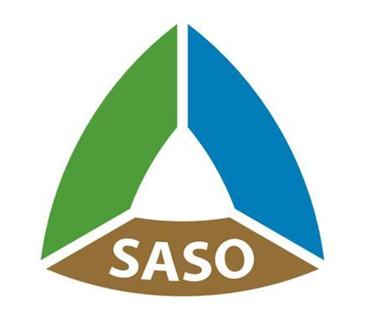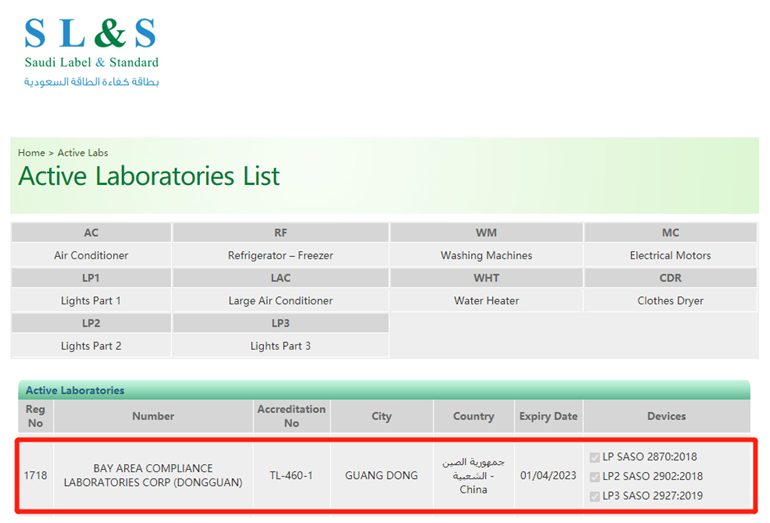Certification Introduction:
SASO is the abbreviation of the English Saudi Arabian Standards organization, that is, the Saudi Arabian Standards organization. In fact, many SASO standards are based on the safety standards of relevant international organizations such as the International Electrotechnical Commission (IEC). Like many other countries, Saudi Arabia has added some unique items to the standard according to its own country's civil and industrial voltage, geographical and climatic environment, ethnic and religious habits, etc. In order to achieve the purpose of protecting consumers, SASO standards not only apply to products imported from abroad, but also apply to products produced in Saudi Arabia.

Basic Certification Information:
1) Regulated product (Regulated product) :
• Product Registration + PCoC (G-Mark, Type approval, Q-Mark, IECEE RC) + SCoC
2) Unregulated product (Unregulated product):
• Product Registration + SCoC
• Is it mandatory: yes
• Controlled products: Products controlled by the SABER certification list
• Certificate validity period:
• PCoC: Single certificate valid for 1 year
• SCoC: Single batch valid
As a testing laboratory (lab code: EE LAB 0121) accredited by the Saudi Bureau of Standards, BACL currently has all the qualifications and authorizations for energy efficiency testing of household lighting products bulbs, lamps and street lighting fixtures in the Saudi market. It can be used for general lighting, Provide testing and certification services for street lamps, tunnel lighting, incandescent lamps, halogen lamps, compact fluorescent lamps, LED lamps, CFLs, directional and non-directional integrated lamps, control devices and other lighting products.
In 2018, the Saudi Bureau of Standards SASO released two new energy efficiency standards SASO 2870/2018 and SASO 2902/ 2018 for lighting products, requiring mandatory implementation in April 2019; in 2019, a new standard SASO 2927/2019 was released, requiring June 2020 Mandatory from the 1st. Manufacturers and importers of lighting products within the scope of the regulations must comply with this standard and register with SASO to obtain energy efficiency certificates, and at the same time affix corresponding energy efficiency labels on officially registered products.
1. SASO 2870/2018 is an updated version of the original mandatory standard SASO 2870/2015, which mainly updates the new energy efficiency label style for lighting products. The product range currently targeted is between 60lm and 12000lm of luminous flux, directional or non-directional light sources for general lighting use, such as incandescent lamps, halogen lamps, compact fluorescent lamps with integrated ballasts, LED lamps (incandescent lamps Replacement type), LED lamp (halogen lamp replacement type), etc.
2. SASO 2902/2018 is a new energy efficiency standard for lighting products, covering some lighting products that are not included in the SASO 2870 standard, such as incandescent lamps, halogen lamps, LEDs, CFLs, and directional and non-directional integration of more than 12,000 lumens Type lamps, control devices, etc. have all been added as Saudi energy efficiency control products. The SASO 2902/2018 standard has been officially enforced since December 7, 2018.
3. SASO 2927/2019 is the Saudi energy efficiency standard for street lamps. From February 15, 2020, products related to street lamps will no longer accept the registration of the energy efficiency standard of SASO 2902. Before June 1, 2020, the previously passed All street lights must be registered with SASO 2927.

The need for SASO Certification:
The Ministry of Industry and Commerce of Saudi Arabia and SASO require that all products included in the SASO certification standard have SASO certification when entering Saudi customs. Products without SASO certificates will be refused entry by Saudi port customs.
When products are exported to Saudi Arabia, the SASO certificate must be issued when the goods enter the customs, and the technical staff of the Saudi Arabian Standards organization will check the certificate; if the SASO certificate cannot be issued, the product will be refused entry or sampled to the Ministry of Industry and Commerce of Saudi Arabia or The laboratory of the Saudi Arabian Standards organization conducts the test. If the test fails, the product will be refused entry, and all expenses shall be borne by the exporting company.

 CN/中国
CN/中国  US/USA
US/USA  KR/Korea
KR/Korea  DE/Germany
DE/Germany  ES/Spain
ES/Spain VN/Việtnam
VN/Việtnam